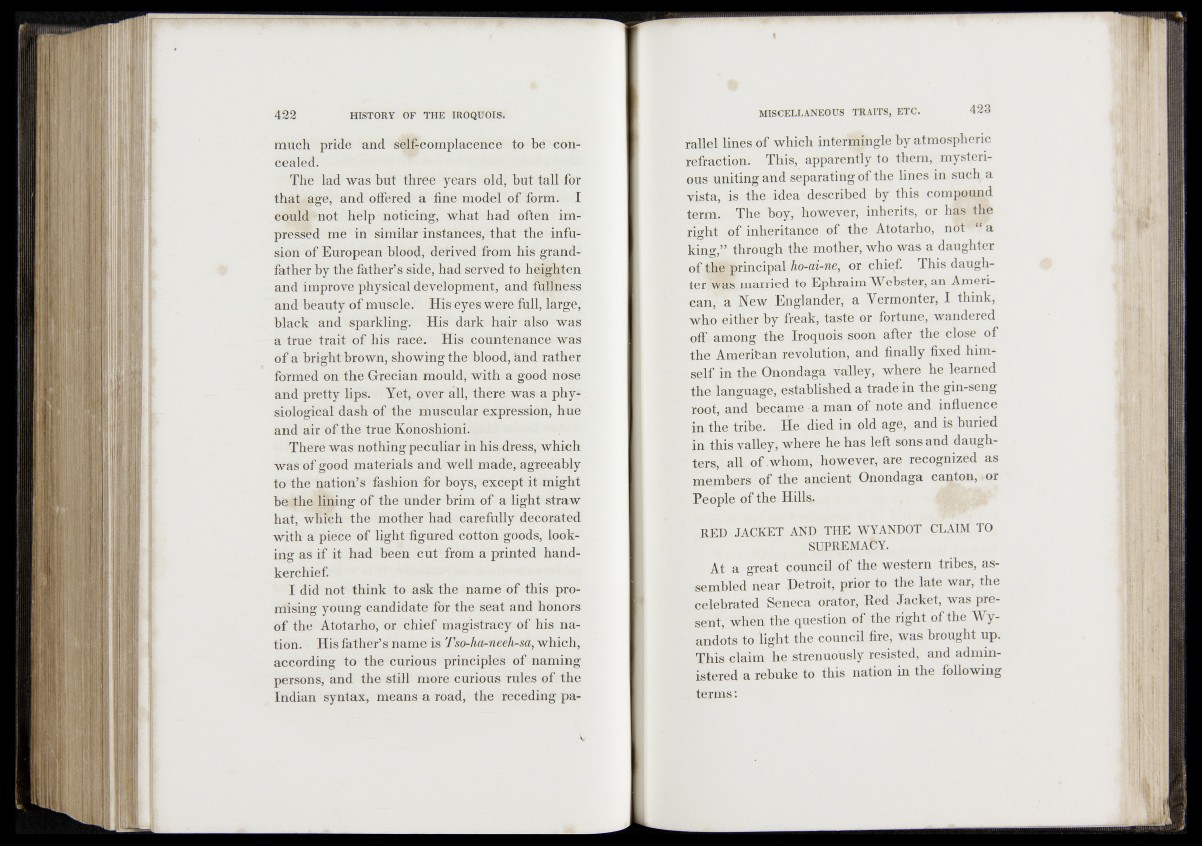
much pride and s®|complacenee to he cop*
coaled.
The lad was but three years old, but tall for
thatggg-e. and offered a fine model of-form. I
could not help noticing, what, had often im-
prCsl^d me in similar instances,-that the infusion
of European blood, derived from his grandfather
by the father’s side, had served to heighten
arid improve physical development, and furlhess
and beauty of muscle, His eyes were full, large,
black and sparkling. His dark hair also was
a true trait of his race;- His countenance was
of a bright brown, showing thecblood, ‘and rather
formed on the Grecian mould, with a good nose
and pretty lips. Ye trover all, there .was a physiological
dash of the. muscular expression, hue
and air of the true Konohhioni.
There was nothing peculiar in his^dress, which
was ofigood materials and well made, agreeably
to the nation’s fashion fot boys; except it might
bfeithe lining of the under brim of a light straw
hat, which the mother had- carefully' decorated
with a pietee of light figured cotton goods, looking
as if it had been cut from a printed handkerchief.
I did not think to ask the name of this pro-
rriising young candidate for the seat and honors
of the Atotarho, or chief magistracy of his nation.
His father’s name is Tso-harneeh-sa, which,
according to the curious principles of naming
persons, and the still more curious rules of the
Indian syntax, means a road, the receding parallel
lines of which interiiingle by atmospheric
refraction. This, apparently to them, mysterious
uniting and separating of the lines in such a
vista, is the idea described by this compound
term. The boy, however, inherits, or has the
right of inheritance of the Atotarho, noP^Ji
king,’’ through the mother, who was a daughter
of tM^principal Jio-airmi or êhiqf. This daughter
was married , to Ephraim Webster, an American
JaKew Englander, a Vermonter, I think,
who .either by freak, taste or fortune, wandered
off among the Iroquoig soon after the close of
the American revolution, and finally fixed himself
in the Onondaga valley, where he learned
the language, established a trade in the gin-seng
root, and became a man of note and influence
in the tribe. He died in old age, and is buried
in this valley, where he has left sons and daughters,
all of .whom, however, are recognized as
members of the ancient Onondaga canton, »or
People of the Hills.*
RED JACKET AND THE WYANDOT CLAIM TO
SUPREMACY.
At a great council of the western tribes, assembled
near Detroit, prior to the late war, the
celebrated Seneca orator, Red Jacket, was present,
when the question of the right of the Wy-
andots to light the council fire, was brought up.
This claim he strenuously resisted, and administered
a rebuke to this nation in the following
, terms: